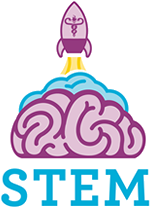USAMRDC Summer 2020 HBCU/MI Research Program
Meet the USAMRDC Summer 2020 Cohort of the Historically Black College and Universities (HBCU)/Minority-serving Institutions (MI) Summer Research Program
September 29, 2020
Overview
The U.S. Department of Defense (DOD) HBCU/MI Summer Research Program aims to increase the number of minority scientists and engineers in DOD programs and positions. The initiative encourages students in science, technology, engineering, and mathematics (STEM) disciplines, guides them toward advanced studies, and prepares them for careers in science and engineering fields. Motivated students, both undergraduate and graduate, are placed in a ten-week research experience at DOD facilities across the country. Under the supervision of DOD scientists and engineers, students conduct research relevant to the defense mission.
The 2020 program was fully funded by the DOD and was of no cost to students, labs, or mentors. Funding amounts included round trip travel to the internship location at the beginning and end of summer, a relocation stipend, daily travel to and from the worksite, regular pay for hours worked, and living expenses.
Meet the Student Researchers
Daniel "Joshua" Barron
University of Texas at San Antonio
Electrical Engineering
USAARL
Lauren Bennett
Tuskegee University
Nursing
USAISR
Maria Browne
Florida A&M University
Biology
WRAIR
Jhah Cook
Mississippi Valley State University
Biology and Chemistry
WRAIR
Amanda Harvey
Hampton University
Cellular and Molecular Biology
WRAIR
*Not included are CarmenMichelle Flowers (USAARL), Destiny Ball (USAISR), and Kevin Thompson (USARIEM) who participated in the program but were not able to be interviewed.
Overview of MRDC Summer Research
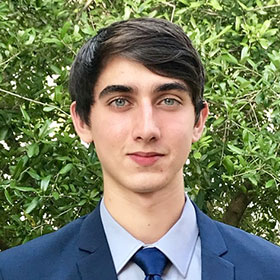
Daniel "Joshua" Barron
The project I was involved with was to streamline the process of doing dexterity tests because, as of right now, the way it was described to me by my mentor was that for certain jobs you have to meet certain dexterity requirements in the military; and each time someone needs a test they have to schedule an appointment and wait a couple of weeks and actually have the test done by a physician and even then you can have issues where human error could cause issues. The design of this was to create a quick way of doing it using an elite motion device that tracks the hand and records you bending in several different positions and then outputs the actual dexterity values. The objective and the contact would be much quicker than having to schedule an actual appointment.
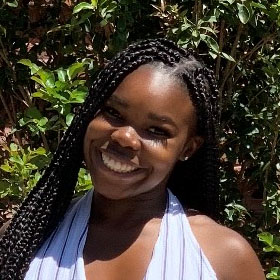
Lauren Bennett
My topic was the intercellular pathways that regulate platelet activation and my pathway was cyclic GMP. Daily, I would usually call my mentor in the morning and since we built our pathway from scratch, starting with cyclic GMP and then branching from there, he would ask me what would stimulate cyclic GMP and we would go from there. To find out the actual research, we would usually use PubMed or Wikipedia and use key words to search for publications and information.
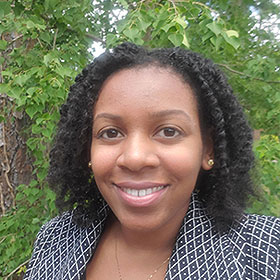
Maria Browne
I got very lucky with my placement working at WRAIR in the malaria vaccine division. Traditionally they have been working on vaccines for malaria and they actually have a vaccine that is in Phase 3 clinical trials but because of the pandemic going on they are partnering with another lab and doing research on COVID-19. I was given the opportunity, since it was going to be virtual, to do a vaccine proposal on either malaria or COVID-19 and I chose the latter. My task was to design a vaccine candidate and come up with a study to test it, all based off of current literature, new technologies, and what they are doing in the lab.
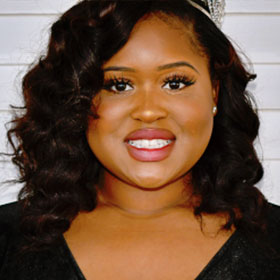
Jhah Cook
The research that I did this summer was how space impacts the brain function and we really focused on transcriptomic investigation of rodent brains that was selected under the NASA Rodent Research-2 (RR-2) Program. Shuttle launches produces excessive vibration, noise, and sudden change in gravitational forces and sometimes those can cause a lot of stressful conditions for space travelers in addition to other stressors that you're not really going to find when they are here on Earth. One of those things that we really focused on was microgravity. We performed a systematic time course analysis to just understand the processes involved in adapting to an extended period of time in space. The lab used female mice that were attained from the NASA RR-2 project that was on the International Space Station. These mice were 16 weeks of age at the time that they were launched for the ones that were and they were euthanized and whole carcass got frozen at one, two, four, and eight weeks post launch. On the other end, there was a ground base experiment that mirrored the space study and that was more so of a control and whole brain from both sets of the mice were collected on Earth and the micro-RNAs were extracted from those brain tissues. My job this summer was to look at the differential expression analysis that was done by comparing the microgravity mice with their time match ground controls.
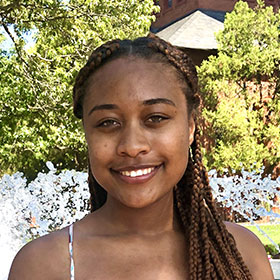
Amanda Harvey
I was at Walter Reed Army Institute of Research and I was in the MRSB lab and particularly what I worked on PTSD and studying PTSD within mice. I was looking at mice on the molecular level and seeing if there were any particular genes that were traced with PTSD and the readings that go with PTSD. We used a software and I used another database so I could trace which genes were specifically significant genes that showed increase or decrease in expression. With that we measured one gene across two time periods under the trial simulation of PTSD for ten days so that I was able to trace what the genes looked like 24 hours after the trial period and 6 weeks after that trial period. From there I was able to find common genes that increased and decreased in expression that were able to be traced back to biological processes in the body that relate to PTSD causing the effects of it.
Favorite aspect of the HBCU/MSI Summer Research Program and/or most amazing experience

Daniel "Joshua" Barron
The last week was my favorite because we finished the code maybe two weeks out and we were doing well and everything should have been doing fine and then we started doing tests and it was just not accurate. I had done some initial tests in the beginning to make sure it was accurate enough but I had only tested one joint and now that I was testing all the joints in the hand it was not doing anywhere near accurate. It was precise but it wasn't measuring the correct values. The last week it really came all together and I started finding out that the device captures some hand positions better than others so I had to go and test and record multiple different hand positions and go back and look at the data and see if it worked. I tried different variations of certain joint positions to find out which the device could read the best and so there was a lot of trial and error to try and find that there was a set of 7 hand positions that would capture the range and more importantly could be accurately read by the motion device. Something about that it seemed like it wasn't going to work to "Oh my gosh, it's working," and actually really precise and accurate all in the fit of one week was an emotional rollercoaster that I really enjoyed.

Lauren Bennett
For me, it was the weekly Zoom meetings. For my group in Texas, ISR, we actually did weekly Zoom meetings on Tuesdays for Journal Club. Each week a different intern would go two at a time and have an article and present it to everyone. On Thursdays it was mentor presentations where we actually got to know what each of the mentors at ISR did which was really nice. It was nice to get away from the research for a little bit and have a nice group meeting.

Maria Browne
I think my favorite aspect of the program was just getting to work with everyone in the lab. They really went above and beyond to make me feel like I was there with them and a part of the team. They created videos every week for me on them carrying out their experiments in the lab and breaking everything down. We met as an entire lab, there were eight of us total, twice a week just giving updates and doing a journal club where people would pick out pieces of scientific literature that they thought was interesting and present it to the group so we could all openly discuss it. I also met with someone once or twice a week to go over articles that would help me with my proposal and help me along the way. Just getting to see everyone work together as a team to accomplish what they were trying to do was huge. In the lab I work in at Florida A&M University there are only about 2 or 3 of us but with this being a larger group and them being in a higher stage of development than we were, just seeing everyone having their own task and working on their own different areas of research and the way it came together and how there would be so much feedback to continuously change the way they were working was interesting. Someone would go into the lab and purify a protein and maybe they wouldn't have the best yield so in one of our meeting they would come and create a graph or a PowerPoint and present everything they did and then we would all give them feedback on it. It was really nice to see the way it all worked together.

Jhah Cook
The first thing was finding out exactly what I wanted to do as far as my PhD work is concerned. It was kind of like the project just fell into my lap. I did have rapport with the lab director as soon as I accepted the internship and signed all of the paperwork just to get a little more acquainted before I was to go to the lab. We weren't initially sure what project I would be doing but whenever it came time to actually beginning the internship, about a week before, someone from the lab contacted me and asked if I would like work on something that deals with mice and sending them to space and analyzing the brain tissue. I thought, this is what I want to do for the rest of my life. I have always been interested in neuroscience but to be able to see those two things go together in a way that I was familiar with was an amazing experience. I did not expect that to happen and I am just so thankful.

Amanda Harvey
I would say my favorite thing about the whole entire internship was my mentor and the lab that I was in. There were so many people who helped me and there were so many people who gave me input and insight and would contact me if I needed help. I feel like the lab I was in was a very family-like atmosphere and I wasn't scared to ask questions. I felt like the research I did was my own research and I felt like I made some type of contribution. Another thing that I liked that my one mentor did was anytime I had a question about how to work a program or work something, he would give me the introduction to it but tell me I had to do it myself because it would be the best way to learn and understand it. I felt that it wasn't handed to me and I was able to work hard and learned even more than what I thought was possible.
Feedback and/or recommendations for other students interested in this program

Daniel "Joshua" Barron
In terms of my experience which was virtual, it will probably be different for those that go in person but most of my feedback would actually be towards the learning how to promote work because it was kind of interesting at first and so I finally found the groove of what works. There were some hassles where if I had an issue it wouldn't be the same as being in the lab with my mentor where I could walk over and talk to them. Having to send an email and wait for the reply, there were some delays and I think that the biggest recommendation I can make would be for students to learn how to flow with the work because you may have aspects that are put on pause. For example, when I had to get the hand testing data I did a recording to send to my mentor to look at and while he was looking at it I couldn't continue working on it and so I had to put that part on pause and move to taking detailed images and labeling the pictures. Quickly adapting and switching focuses I feel is very important in general but even more so when you are in an online environment. Another recommendation is to be clear with your mentor and what the plan of attack is.

Lauren Bennett
Overall, I thoroughly enjoyed it and learned a lot. My mentor was great and very hands-on, and he definitely knew a lot about my topic, the intercellular pathways and platelet activation. Since he did have four other mentees with him we were each able to handle a different pathway. The time change was a little hard because I am two hours behind Texas time but other than that it was great and I thoroughly enjoyed it.

Maria Browne
I would definitely recommend the program to anyone and everyone that wanted to do a summer internship. I couldn't recommend it enough. I found the internship on my own and once I did I called my pre-med adviser and let them know that this is out there and I don't think it is well known but this is such a great opportunity. Just being able to work in labs of the caliber that is within the DoD is absolutely amazing and the mentorship was amazing. Being able to create poster boards and present them and the symposium that was going to happen, which still may virtually, those are opportunities that don't come very often or easily when you are just in college. I think it is important to reach out and get more experience and this is definitely a great program to do it. I came from a military family so I was really open to the Department of Defense and I was explaining to one of my friends who said she didn't want to enlist in the military that you don't have to. The civilians I worked with showed a different side of it I had never seen that before. I am used to people in the military working for the military but not necessarily civilians and contractors who work in these labs. I would definitely recommend this program.

Jhah Cook
I would definitely say start small, it's okay if you don't get a bigger internship that you think is more prestigious in your eyes - but start somewhere. For me, it was applying to two bigger internships and getting rejected but I was still able to slowly ease into what it was like to be an intern my first year of school. It was still on campus and it wasn't exactly what I wanted to do but it got me to this point. My first one was a chemistry internship and my next one was a bioinformatics internship. I didn't know anything about bioinformatics and I wasn't sure I was even going to like it because I was so against technology for as long as I can remember. I ended up really liking it and that really helped me later on with completing my senior thesis for two years and then getting this internship where I had to do a lot of computational biology. Just remember that you have to start somewhere and you might find what you like unexpectedly. One more thing that I would say for anyone that plans on applying would be to start the application early because a federal resume is one of the longest things to do and took me almost 3 weeks to get it up to my standards. I think that really helped me to secure this opportunity because I looked good on paper and was able to showcase that and be as specific as possible.

Amanda Harvey
The only thing I would recommend to students is to come in there mentally ready to work hard, be dedicated, and know that even though they might understand research they will not fully understand it until you are actually in it. Come in there with an open mind, be prepared to ask questions, and be prepared to do more than what is expected of you because that is how you are going to get the most out of it.
Career aspirations and future goals

Daniel "Joshua" Barron
I am currently doing research with Master's students and that has really made me desire to do a master's program, either at my school or another school. I love research and having an idea for a concept where you design it and have to get it running in a certain amount of time, kind of along the lines of product development. I love that, especially when it is a mixture of hardware and software where you are physically testing and doing slight tweaks in the code. I do want my career to be more of that but overall I want the theme of my career to be helping others. This was a great way to help save time for military and open up physicians who may be needed for something else. I don't know exactly what I am going to be doing but I do know that whatever it is, I want it to be helping others with my technology skills.

Lauren Bennett
Since I am a junior I am very excited. I just got accepted into the Professional Phase of Nursing Program. After my five semesters, I should be graduating with my BSN and hopefully passing my RN test to become an RN. I would actually like to be a nurse anesthetist so I would be in the field in a hospital for one year after I graduate being an RN and getting field experience. Then I will be applying for a nurse anesthetist program which is a three year doctorate program and I am going to go from there.

Maria Browne
This experience definitely solidified me wanting to pursue a PhD so as of right now I am looking into the MD-PhD track. I am just wanting to get as much experience as I can within the world of research. I have a little bit of experience with cancer and this was a great experience in vaccinology so I really want to get my hands into neuroscience next and just see what that field has to offer. Hopefully I will be able to do this research experience again and I will definitely be applying again.

Jhah Cook
After graduation I do want to do a post-baccalaureate program just to prepare me for the transition from undergraduate to graduate school. After that I plan to matriculate into an MD- PhD program and really focus on translational science because I want to study and really understand the mechanisms that underlie a patient's disease. I do still want to treat them in a clinical setting but my main goal for the future is to really conduct sustained research that helps to bridge the gap between laboratory work and the diagnosis and treatment of various diseases.

Amanda Harvey
I want to be a Physician's Assistant. I have aspirations to do that but I also like research and I especially like human research so I feel like within the medical field and research, they go hand in hand so I also want to do research on the side and potentially partner with someone like WRAIR and do some research on my own.
*Mr. Donald Hughes was initially included in this article due to an error but completed his internship at CCDC ARL. Information about the CCDC ARL program can be found here.
Last Modified Date: 18 November 2024




























